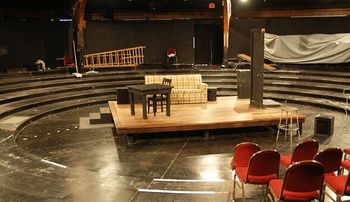Some of our finest
Citable Articles (145)
Developed Articles (1,150)
(17,726 total articles)
|
There is only one good, knowledge, and one evil, ignorance.
— Socrates (469 BC - 399 BC), Diogenes Laertius, Lives of Eminent Philosophers
—add a quotation about knowledge or writing
|
|
Theater in the round refers to theatrical performance space in which the audience sits on most or all sides of the stage (as opposed to the customary proscenium stage in which the performers face the audience, or the thrust stage where the audience sits on three sides).
Theaters in the round were common in ancient times, and although it never fell completely into disuse, the modern theater as it developed in Europe and America, generally favoured the proscenium theatre, which allows for grander productions. When the theater in the round format was revived in the mid-twentieth century, it was considered avant garde and progressive.
One advantage of theatres in the round is that they can dramatically reduce the need for lavish or complicated sets, in terms of curtains and scenery. A disadvantage is the extra staging considerations. Rather than the actors being able to focus to one direction, the director and set designer have to consider what the production will look like from different points of view, and how to eliminate or at least reduce the problem of characters having their backs to the audience.
The Stephen Joseph Theatre[1] in Scarborough, North Yorkshire was the UK's first theatre in the round.[2]
Alienation effect vs. Stanislovski technique
Theater in the round is a particularly appropriate setting for staging of dramas using Bertolt Brecht's alienation effect[3], which stands in opposition to the more traditional Stanislovski technique
[4] in drama. Whereas the Constantin Stanislavski school of acting attempts to immerse the audience so deeply in belief of its characters that they can imagine themselves as the character, the Brechtian alienation effect deliverately tries to remind the audience that this is a fictional representation. Alienation techniques include tactics as obvious as displaying placards or posters around the set. With theater in the round, merely keeping the audience lit so that each audience member is constantly aware of the rest of the audience can act as an alienation technique.
Notes
- ↑ Wikipedia has more information about the Stephen Joseph Theatre.
- ↑
New Vic Theatre: 'Theatre-in-the-Round'. Accessed January 24, 2021.
- ↑
Alienation Effect in Encyclopedia Britannica online.
- ↑
The book "An Actor Prepares" was first published in 1936 and is the first volume of the translations of Constantin Stanislavski's books on acting, which were published as a trilogy in English, though originally meant to be published as two books in Russian.
|
